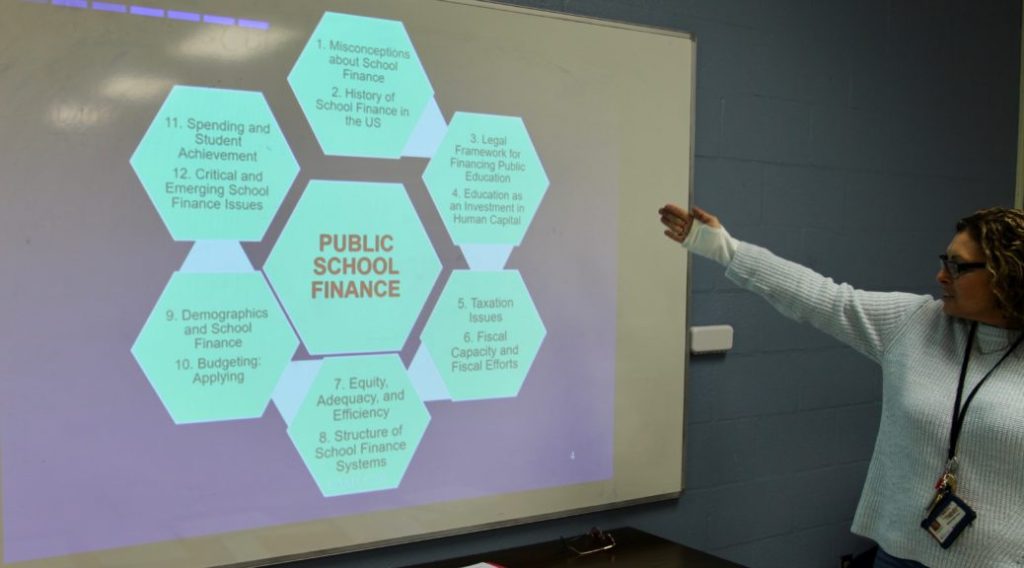NASHVILLE, Tenn. (TSU News Service) – The Tennessee State University College of Education has received another $300,000 grant from the Tennessee Department of Education to train an additional 51 aspiring assistant principals in Middle Tennessee school districts. This brings to 101 the total number of individuals to be trained in the one-year program.

“Tennessee State University is taking the lead in the state’s assistant principal training program, as a further recognition of the quality of our programs,” says Dr. Jerri Haynes, dean of the College of Education.”
“This is an opportunity the university is certainly proud to receive. Through this program we are helping to fill the void or shortage of assistant principals, especially minorities.”

Last January, the college received $300,000 to begin the training of the first group of 49 aspiring assistant principals. Officials say this is part of a longstanding collaborative partnership between the university, the state agency and K-12 systems aimed at attracting more qualified applicants for positions in school leadership.
The funding from the Tennessee Department Education will be used to conduct a one-year, master’s degree-level training for cohorts from the region, including four of the state’s largest school systems – Metro Nashville Public Schools, Shelby County Schools, Rutherford County and Clarksville. In May, the first cohort took one course during Maymester, an accelerated summer program. To catch up, the new group will take two courses during next year’s Maymester to finish the program at the same time.
Dr. Terrance McNeil, assistant professor of educational administration and coordinator of the training program, says to have the ability to have “such a large influence” on what happens next across the state in terms of educational leadership is a tremendous opportunity for the College of Education.
“We have taken the lead in the state in terms of this initiative,” says McNeil. “What that mean is that we have the rare opportunity to prepare the next generation of principals in cooperation with the Tennessee Department of Education, and that really makes us happy from the professional standpoint.”
TSU students in the educational leadership program contacted in January said the strength of the curriculum would be helpful in developing the leadership skills of the aspiring assistant principals.
“This program helps build character because it offers a lot of field experiences where we go and directly talk to people and observe what they are doing,” said Pragati Natraj, a first-year graduate student from India majoring in instructional leadership.
Bridney Jones, who’s also pursuing her master’s degree in educational leadership, agreed.
“I believe this course will benefit the new cohorts by giving them strong hands-on and practical experience they will need as leaders,” said Jones, of Chattanooga, Tennessee.
According to Haynes, participants in the program are teachers who have been selected by their superintendents or principals to take part in the training. All courses in the program, which is from June 2020 to June 2021, are offered online. When completed, participants will receive professional licensure as educational leaders.
“We have developed a special program of study for this project,” says Haynes. “We are going to provide them the theory and application, as well as internships and on-the-job training. They will receive university mentors, and we will work to identify mentors at their schools where they work.”
Dr. Latasha Lang, an adjunct faculty, who is one of the instructors in the program, says to be able to be taught by people who have experience as principals or assistant principals is a “wonderful opportunity” for the trainees.
“For those that are aspiring to become assistant principals, this is an excellent way to get information about what actually occurs in the school building,” says Land, who also currently serves as a high school assistant principal. “The program offers the opportunity to discuss scenarios, to be able to ask questions, and get information on things that have actually occurred. I am very excited about this.”
For more information about the Aspiring Assistant Principals Program and other graduate-level programs in the in the College of Education, visit http://www.tnstate.edu/coe/.
Department of Media Relations
Tennessee State University
3500 John Merritt Boulevard
Nashville, Tennessee 37209
615.963.5331
About Tennessee State University
Founded in 1912, Tennessee State University is Nashville’s only public university, and is a premier, historically black university and land-grant institution offering 39 bachelor’s degree programs, 24 master’s degree programs, and seven doctoral degrees. TSU is a comprehensive research intensive institution with a R-2 Carnegie designation, and has a graduate school on its downtown Avon Williams Campus, along with the Otis Floyd Nursery Research Center in McMinnville, Tennessee. With a commitment to excellence, Tennessee State University provides students with a quality education in a nurturing and innovative environment that prepares them as alumni to be global leaders in every facet of society. Visit the University online at tnstate.edu.
